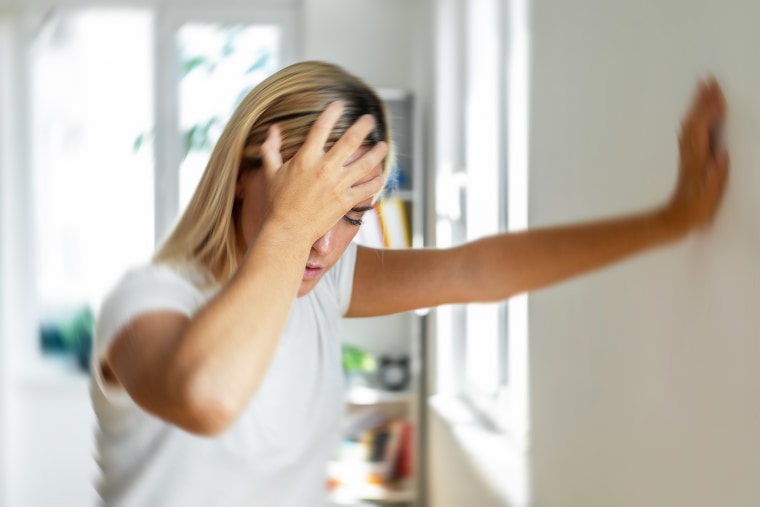Fainting may seem like a movie cliché to add drama to a scene, but doctors say it can happen to anyone in real life — including healthy people.
Syncope, the medical term for passing out, happens when there’s a sudden change in the blood flow to the brain, according to the National Institute of Neurological Disorders and Stroke.
It usually happens when blood pressure is too low and the heart doesn’t pump enough oxygen to the head, the American Heart Association notes.
Fainting is one of the most common issues emergency medicine doctors see, says Dr. Torree McGowan, an emergency medicine physician in Culver, Oregon, and a spokesperson for the American College of Emergency Physicians.
“In general, passing out can be all the way from completely benign — you got a little bit woozy when you saw some blood — all the way up to life-threatening — your heart wasn’t beating correctly,” McGowan tells TODAY.com.
“When we see people in the emergency room, we try to figure out: Where on that spectrum do they fall?”
No matter the cause, the consequences of suddenly fainting can be severe, including cracked skulls and brain injuries, she says.
A Tennessee woman suffered painful facial injuries and a large scar on her forehead when she fell face first onto the hardwood floor in her home. It happened when she experienced a bad reaction to a delta-8 THC gummy she took for pain relief, causing her blood pressure to drop, she told TODAY.com.

Dr. Robert Wachter, chair of the department of medicine at the University of California, San Francisco, fainted while taking a hot shower, hit his head, and suffered bleeding in the space around his brain plus a small cervical fracture, he tweeted on July 12, along with a photo of his bruised face.
“Stepping into hot water when you’re dehydrated and flu-ish can cause your blood vessels to dilate, leading to a dangerous drop in blood pressure,” Wachter wrote. “I (woke) up in a bloody pool on my bathroom floor.”
Signs you’re about to pass out:
Passing out with absolutely no warning is uncommon, but when it happens, doctors worry about heart rhythm problems — a more serious cause of fainting, McGowan says.
Most people will have symptoms when they’re about to lose consciousness, she notes. They include:
- Feeling dizzy, nauseated or lightheaded.
- Having cold or clammy, sweaty skin.
- Experiencing visual changes such as tunnel vision, vision that blurs or goes dark, or seeing spots. People around you might notice you have dilated pupils.
- Feeling a sensation of warmth — “It feels like your whole body blushes,” says Bri Clark, the Tennessee woman who passed out. “My whole body got really tingly.”
- Turning pale.
- Experiencing shortness of breath.
How to prevent fainting:
If you start feeling like you are about to pass out, it’s best to immediately sit or lie down if you are able to, McGowan advises. That helps the body get horizontal to ensure blood flow to the head and protect the brain, she explains. It also minimizes the chances of getting injured if you were to lose consciousness.
Another way to prevent fainting when you feel symptoms coming on is to try applied tension, a technique that involves tensing muscles to raise your blood pressure.
The National Institute of Neurological Disorders and Stroke advises:
- Making a fist.
- Crossing your legs.
- Squeezing your thighs together.
- Tightening the muscles in your arms.
How to recover from passing out:
The loss of consciousness may last for a minute or two before the person slowly comes back to normal, the National Institute of Neurological Disorders and Stroke notes.
It recommends the patient lie down for 10 to 15 minutes in a cool, quiet area or sit with their head between their knees. Sipping on cold water can also help.
Causes for passing out:
McGowan says they include:
Getting your blood drawn or seeing blood — some people also faint at the sight of needles or other medical equipment.
Eating or drinking too little — dehydration is an especially common cause in the summer. Being in a hot environment can cause heat syncope.
Feeling anxious or nervous — on your first day of work, for example.
Going to the bathroom — “Strangely enough, there’s a reflex that happens that people can get lightheaded, especially if they’re having a bowel movement and bearing down really hard. That’s a well-described reason to get dizzy and lightheaded,” McGowan says.
Coughing — during the COVID-19 pandemic, people would sometimes cough to the point where they would pass out, she notes.
Low blood sugar.
Standing up too quickly — orthostatic hypotension is a drop in blood pressure that happens when a person rises from lying down to standing. This can cause lightheadedness in some people. In postural orthostatic tachycardia syndrome (POTS), the lightheadedness also comes with a rapid increase in heartbeat.
Taking medications or supplements that might lower blood pressure.
Heart rhythm problems — this is a much more serious cause of passing out, and people can faint with no warning, McGowan says. It’s much more common in older people or patients with heart disease.
Bottom line:
Fainting is usually nothing to worry about, but it can sometimes be a sign of a serious problem, the National Library of Medicine notes.
If you pass out without a good explanation, talk to your healthcare provider to rule out any underlying medical conditions, McGowan advises.

